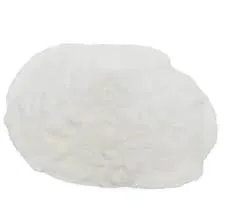
Sep . 22, 2024 08:01 Back to list
hydroxyéthyl cellulose
Hydroxyethyl Cellulose A Versatile Polymer for Diverse Applications
Hydroxyethyl cellulose (HEC) is a non-ionic, water-soluble polymer derived from cellulose, a natural polymer abundantly found in plant cell walls. With its unique chemical structure, HEC has gained prominence in various industries due to its exceptional properties such as thickening, binding, film-forming, and water-retaining capabilities. This article explores the functionalities, applications, and benefits of hydroxyethyl cellulose.
Chemical Structure and Properties
Hydroxyethyl cellulose is synthesized by ethoxylating cellulose, which introduces hydroxyethyl groups into the molecular structure. This modification enhances the solubility and thermal stability of cellulose. HEC exhibits remarkable rheological properties, which makes it an ideal thickening agent in many formulations. Its non-ionic nature allows HEC to interact with a broad range of substances, making it compatible with numerous other ingredients without adverse reactions.
One of the most notable properties of HEC is its ability to form viscous solutions at low concentrations, which can significantly improve the texture and sensory profile of various products. Additionally, HEC displays pseudoplastic behavior, meaning viscosity decreases under shear stress, making it easier to apply in applications like coatings and personal care products.
Applications in Various Industries
1. Personal Care and Cosmetics Hydroxyethyl cellulose is commonly used in hair care products, lotions, and creams due to its thickening and gelling properties. It helps enhance the texture of formulations and provides a smooth, silky feel upon application. HEC is also utilized in shampoos and conditioners to impart stability and improve product viscosity.
hydroxyéthyl cellulose

2. Food Industry In the food sector, HEC serves as a stabilizer, emulsifier, and thickening agent. It is often found in sauces, dressings, and dairy products to enhance texture and improve mouthfeel. Additionally, HEC can help retain moisture in baked goods, thereby extending shelf life and improving overall quality.
3. Pharmaceuticals HEC plays a crucial role in the pharmaceutical formulation industry. It is used as a binder in tablet manufacturing and as a thickener in topical ointments and gels. Its biocompatibility and non-toxic nature make it ideal for use in drug delivery systems, where it can modify release rates and enhance the efficacy of active pharmaceutical ingredients.
4. Construction In construction materials, hydroxyethyl cellulose contributes to the performance of mortars and adhesives. Its water retention properties help maintain workability and improve adhesion, while its thickening characteristics enhance the consistency of materials such as paints and coatings.
Environmental Considerations
As a derivative of cellulose, HEC is considered biodegradable and environmentally friendly, aligning with the growing trend towards sustainable products. The use of HEC can reduce the reliance on synthetic polymers, promoting greener formulations in various industries.
Conclusion
In summary, hydroxyethyl cellulose is a multifunctional polymer that plays an integral role across many industries, including personal care, food, pharmaceuticals, and construction. Its unique properties make it indispensable for improving product performance and consumer experience. As industries increasingly emphasize sustainability, the demand for HEC is likely to grow, underscoring its significance as a versatile and eco-friendly ingredient.
-
Versatile Hpmc Uses in Different Industries
NewsJun.19,2025
-
Redispersible Powder's Role in Enhancing Durability of Construction Products
NewsJun.19,2025
-
Hydroxyethyl Cellulose Applications Driving Green Industrial Processes
NewsJun.19,2025
-
Exploring Different Redispersible Polymer Powder
NewsJun.19,2025
-
Choosing the Right Mortar Bonding Agent
NewsJun.19,2025
-
Applications and Significance of China Hpmc in Modern Industries
NewsJun.19,2025







